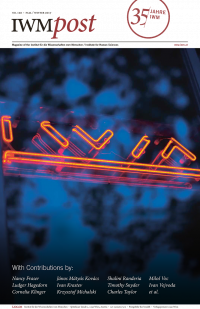When the Institute for Human Sciences was founded in 1982, Europe was divided and there was no end in sight to the Cold War. Borders did not only run along the Iron Curtain but were also present in people’s minds.
Vienna and Austria forged a distinctive path after 1945. We learned from the history of the first half of the twentieth century, signed the Austrian State Treaty in a defining moment after the death of Joseph Stalin, discovered in neutrality—namely a military but not ideological neutrality—the best solution for Austria vis-à-vis the border between eastern and western Europe, and came out emphatically on the side of freedom, democracy and pluralism during the Hungarian Revolution of 1956 as well as the period before and after the crushing of the Prague Spring in 1968. This position was complemented by a readiness to enter into dialogue and conversation.
It also provided the basis for establishing Vienna as the United Nations’ third city and for attracting various international institutions, within which East and West cooperated, to Vienna.
An important development was, for example, the foundation of the International Institute for Applied Systems Analysis (IIASA) in Vienna. A further, larger and more sustainable step was the founding of the Institute for Human Sciences (IWM) in 1982, 35 years ago.
What today appears to many to be self-evident—a free, united Europe—was then a dream that only a few dared to contemplate. Among them were three young scholars—Krzysztof Michalski, Cornelia Klinger and Klaus Nellen—who had an ambitious plan to create in neutral Vienna a site of intellectual and social exchange between East and West. What began as a small, idealistic project that was laughed at by some, developed during the past 35 years into an incomparable success.
As Austrian Minister of Science between 1983 and 1987, I was able to closely observe and to support the IWM’s first steps and, as President of the National Council and President of Austria, I also enjoyed witnessing the institute’s increasingly visible success.
In addition to a Who’s Who list of scholars of the humanities and social sciences, former dissidents, future politicians and internationally renowned journalists and intellectuals frequented the IWM.
However, the IWM was and still is much more than a beacon of scholarship in the heart of Europe. Through numerous events and publications on current and often controversial topics—from transformative processes after 1989 and the integration of the European Union to globalization and contemporary crises—the IWM makes an indispensible contribution to central political and social debates. It is precisely in times such as these, where borders are in demand again, new ideological rifts are opening up and the achievements of democracy are at risk, that an institution like the IWM is more important than ever.
I therefore heartily congratulate the IWM upon its 35th anniversary and wish it and all of us every success under the leadership of Shalini Randeria in continuing to admirably fulfil the institute’s function as a builder of bridges and a critical observer.
Having become Helga Nowotny’s successor a few months ago as chair of IWM’s Board of Trustees, I would like to take this opportunity to offer my predecessor my heartfelt thanks and also to wish all my colleagues much joy in their work going forwards.
Heinz Fischer
Vienna, July 2017
Download the IWMpost 120 as a PDF
Contents
Research at the IWM
Die Globalisierung hält Einzug am IWM / Interview mit Shalini Randeria
Dressing Right: Die Mode der „neuen Rechten“ / von Miloš Vec
Modern Tyrants in the Age of Trump / by Timothy Snyder
The Media in the Post-Truth Era / by Angelina Kariakina and Maxim Trudolyubov
Tango Noir: Russia and the Western Far Right / by Anton Shekhovtsov
Myopia & Shame: Liberals on Post-Communist Hungary / Interview with János Mátyás Kovács
Thinking the Unthinkable: The European Disunion / by Ivan Krastev
Lebenssorge in der Moderne / von Cornelia Klinger
Patočka, Gramsci, and Donald Trump: Reflections on Political Crisis / by Nancy Fraser
Losing Faith in Democracy? / by Charles Taylor
Debates and Talks
Leben wir im Zeitalter des Populismus? / Zusammenfassung der Debatte im Burgtheater
IWM’s 35th Anniversary
Thoughts and Memories
35 Years Institute for Human Sciences
In Memoriam
The Apocalypse and Its Secularization / by Krzysztof Michalski
IWM Pop-Up
Ein Rendevous mit der Wissenschaft / von Saskia Blatakes
Upcoming Events
Impressum
Editors: Marion Gollner, Anita Dick
Editorial Assistance: Simon Garnett, Christina Pössel, Benjamin D. Tendler, Kate Younger, Tatiana Zhurzhenko.
Design: steinkellner/zotter, www.steinkellner.com
Printed by Grasl FairPrint, 2540 Bad Vöslau.
IWMpost is published two times a year.
Current circulation: 75,500
